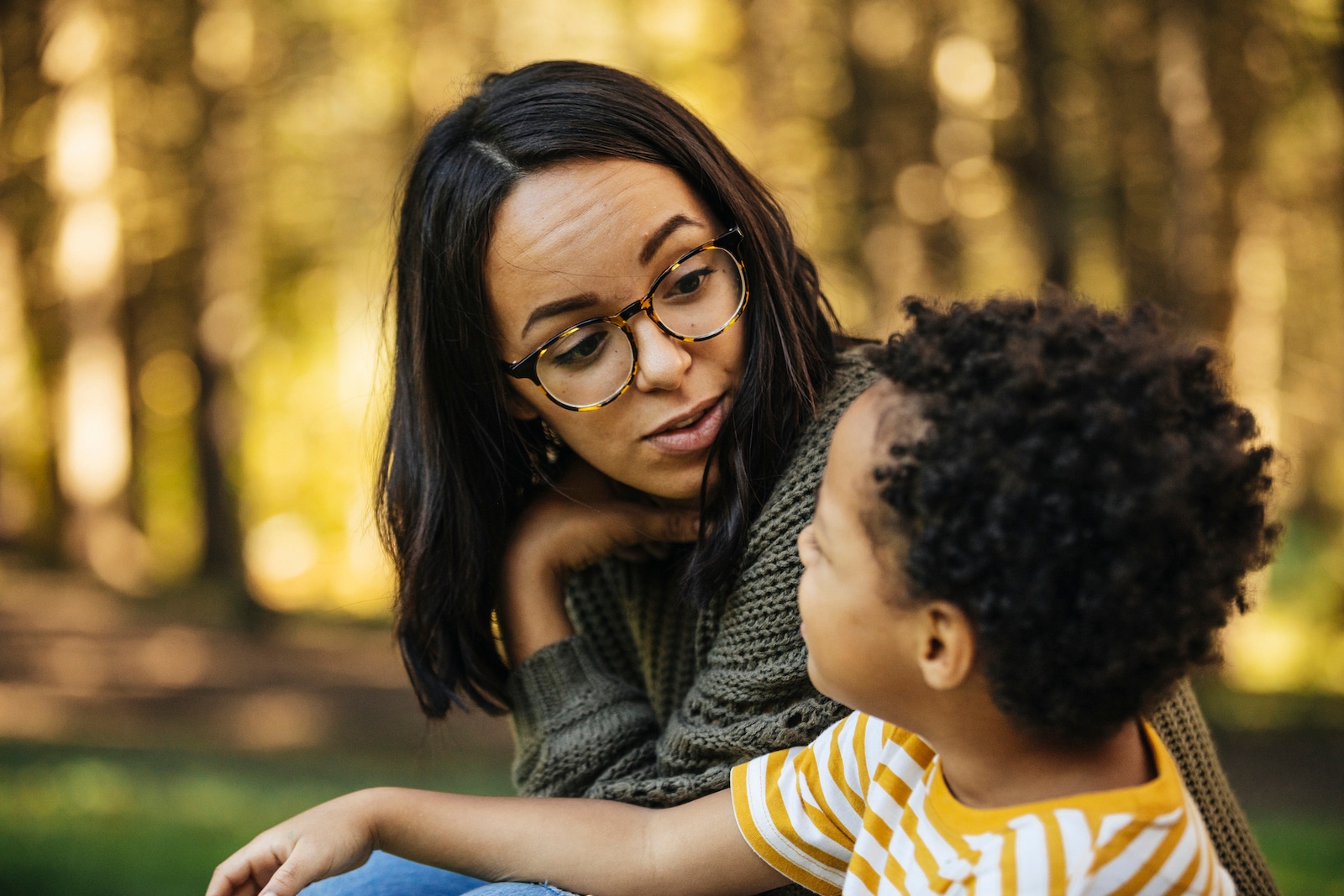Once upon a time your parents may (or may not) have sat you down for “the talk.” You know, the one where you mentally teleported yourself to another place because hearing your mom or dad utter certain words or conjure certain images after years of radio silence on the subject was just too much. Need it even be said? Not super effective.
Thankfully, families are evolving and instead of sitting down for the big (awkward) sex talk, parents and kids are having “bite-sized” conversations around sex often, according to sexuality educator Dawn Ravine, creator of the Never Fear Talks at Lurie Children’s Hospital in Chicago. “One big talk just makes it weird,” Ravine says. “Parents and caregivers should incorporate information about sex into everyday life with their kids. Just as we regularly talk about things like safety, we should be doing it with the subjects of human development and relationships, letting kids know resources are always available.”
Aren’t sure where to begin (or what to do next) when it comes to how to talk to kids about sex? Here, experts offer important insight.
What is the right age to talk to kids about sex?
It can be hard to know what age to talk about sex with kids. The good news is that there actually isn’t one single “right” age. According to Ravine, the earlier parents and caregivers broach the subject of sex, the less uncomfortable it is for everyone (and the less kids will recoil).
“When kids are younger, before there’s even a hint of puberty, the topic of sex is less awkward because it’s less personal,” Ravine says. “The older they are, the more overwhelming it can feel, so having conversations with little kids as topics arise is best. You want to send the message that bodies are OK. They can do things that may feel awkward at times, but that’s OK.”
Two of Ravine’s favorite books on bodies and sexuality for little kids are “What Makes a Baby” and “Bodies Are Cool.”
“You want to send the message that bodies are OK. They can do things that may feel awkward at times, but that’s OK.”
— Dawn Ravine, sexuality educator
How should parents talk to their kids about sex?
Again, Ravine urges having “bite-sized conversations” about sex instead of one big talk, which, for many kids, can “feel like a punishment.” That being said, depending on the child’s age and maturity level, there are a few ways to have these conversations without them feeling like Talks.
“Find natural opportunities for discussion,” Ravine says. “For instance, when you’re watching a show or movie with your child, comment about things that are happening to certain characters. You can say something like: ‘That’s so interesting how she’s worried about her body image,’ or ‘I love how that character came out as bisexual, and her family was so supportive.’” The latter gives the message that you’re OK with a range of sexual orientations in a casual, un-lecture-like manner, she explains.
Another way to broach awkward topics is to casually bring them up as if they’re something that slipped your mind. “When you’re driving or cooking or doing whatever with your child, you can simply say: ‘I was thinking, I realized we haven’t talked about masturbation/orgasm/periods,” Ravine says. “Keep it short and sweet, and if possible, broach it during a time when you don’t have to make deep eye contact since that can feel more formal.”
“Keep it short and sweet, and if possible, broach it during a time when you don’t have to make deep eye contact since that can feel more formal.”
— Dawn Ravine
No matter how you bring up the subject of sex and sexuality, make sure your child knows you’re an open book and someone they can always come to. “A good framework is to provide a little information and then check in with your child using questions like: ‘What have you heard about XYZ?’ and ‘Do you have any questions about XYZ?’ and let your child know that if they think of questions later, they can always ask you then,” explains Tori Cordiano, a clinical psychologist in Beachwood, Ohio, who specializes in the emotional, psychological and behavioral development of children and adolescents.
Cordiano adds that a number of factors will influence how and when you bring certain subjects up, such as your child’s age, their developmental level, their comfort level in talking about these topics and your own comfort level talking about these topics.
Should parents discuss sex differently with girls and boys?
Ravine recommends individualizing discussions, so they’re tailored to each kid. “There are girls who don’t have body issues and boys who do,” Ravine explains. “As soon as parents take the binary aspect out of these conversations, they’re personalizing them and being reminded that they don’t necessarily have to do XYZ just because they have a boy or girl.”
Lauren Schapiro, a psychotherapist with Liz Morrison Therapy in New York City, notes that it’s important for parents to broach the subject of sex in the same way for boys and girls, as “learning about sex divided by gender can lead kids to think they are getting different messages about sex.”
“The messaging regarding the process of sex should be universal,” Schapiro says. “While some things are more biologically related to boys or girls, it is still helpful for them to learn about all of it.”
“The messaging regarding the process of sex should be universal. While some things are more biologically related to boys or girls, it is still helpful for them to learn about all of it.”
— Lauren Schapiro, psychotherapist
Something else to avoid when talking about sex with kids? Presumptions. According to Cordiano and Ravine, parents and caregivers should avoid making presumptions about the following:
- Sexual orientation.
- Future chosen family structure.
- Gender identity.
“In addition to using words like ‘many’ or ‘most’ instead of ‘all,’ it’s important not to assume things like orientation,” Ravine says. “Whether it’s in the conversations you’re having or the books you’re reading, make sure a number of orientations and family structures are represented from an early age. I’ve met kids who went years without saying anything to their parents about their orientation or identity because they were confused about how it would go. Their parents were supportive, but since they never had the conversations early on, the kids were unsure.”
Cordiano explains, “Instead of sexual identity or preference assumptions, affirm to kids that adolescence is not necessarily when every person arrives at a full understanding of who they are and what they like.This may be an ongoing part of their identity formation, and it’s healthy and normal for them to have more questions than answers at this stage of the game.”
How to talk to kids about sex at any age
Birth to age 2
According to Schapiro, this is when kids learn about their different body parts. “When a child is a toddler, it’s helpful for them to learn the names of body parts,” she explains. “It can also be helpful to talk about the functions of those body parts, such as using the bathroom. Another great thing about talking about sex with your child from early on is talking about setting boundaries around nudity and where it is OK to be nude and where it’s not, such as in public.”
Ages 2-5
From ages 2 to 5, it’s good to talk about the privacy of the body parts they previously learned about, as well as others’ privacy with their body parts. “This is also a great age to teach kids they are the boss of their body, and they have a say in who touches their body,” Schapiro says. “An example of this is giving hugs. A child does not have to give someone else a hug and should learn that not everyone wants a hug. Kids should know when it is OK or not OK to give others hugs based on the other person’s comfort level.”
If your preschooler has the habit of touching their private parts, Ravine says to ignore it at this point. “It’s a form of self-soothing,” she says, but adds that, as they get older and depending on how often they’re out of the house, it’s a good idea to explain to them where and when it’s appropriate to do so.
Ages 6-8
“Normalize that some parts of our body may feel good when touched at this age,” says Schapiro. “Also, explain that it is a private experience.”
Ravine adds, “Masturbation isn’t always covered in school sex programs. And it leaves children wondering if it’s bad or OK. We want them to know that, yes, it’s private, but it’s totally normal.”
“Masturbation isn’t always covered in school sex programs. And it leaves children wondering if it’s bad or OK. We want them to know that, yes, it’s private, but it’s totally normal.”
— Dawn Ravine
Ages 9-12
“Here, a focus on helping them understand their own body as it approaches or begins puberty should be a focus of the conversation,” Cordiano says. “The topic of consent also comes up at this stage, even before it occurs as part of a sexual encounter. For example, consent includes letting your child know that they don’t have to hug a relative at Thanksgiving if they’re not comfortable doing so, or helping your child understand that if a sibling says ‘stop,’ a roughhousing game needs to end.”
Cordiano adds that before talking about sex in more explicit terms, this is a great time to use what your child is exposed to daily — advertisements, images online, movies, etc. — to start conversations about sex and sexuality. “Also, consider what your child may be exposed to when you’re not around,” she says. “Many kids are exposed to sexually explicit images online at younger ages than in the past, so it can be necessary to have conversations about what they have viewed online if that occurs.”
Schapiro notes that if your child identifies as LGBTQ+ and you aren’t sure how to answer some of the questions they may have, that’s alright. “It’s OK to say you don’t have all the answers,” she says. “It’s all about keeping the lines of communication open and letting your child know that they are being heard.”
Some kids will be more private than others, particularly at this stage — and that’s perfectly OK. “It’s developmentally appropriate to want privacy. It’s part of the social-emotional independence that happens during puberty,” Ravine explains. “But there’s a difference between privacy and secrecy.” The former, according to Ravine, is perfectly normal and healthy, where the latter is actively trying to hide information due to shame or fear.
If your child isn’t wont to be super talkative about certain topics, Ravine recommends simply letting them know that you’re there for them if anything is wrong or if they have any questions.
How to talk about sex with teenagers
“Conversations at this stage are extensions of what has hopefully started when teens were younger,” Cordiano says. “Here, the conversation may focus more on how teenagers can take good care of themselves and their bodies while also treating others safely and with respect.”
“Conversations at this stage are extensions of what has hopefully started when teens were younger.”
— Tori Cordiano, clinical psychologist
Cordiano adds, “Conversations about consent continue here and may be more explicitly tied to helping teens navigate romantic relationships. And again, these are likely to be more effective when they are briefer check-ins in response to real-life situations, rather than longer lectures in which teens are likely to feel uncomfortable and tune out.”
The bottom line
The older kids get, the more awkward conversations about sex can feel, which is why it’s important to both start them early on and keep them casual and brief. Additionally, while having these conversations (or ideally before), take note of how you feel when wading through the subjects.
“An important point for all parents is to explore their own feelings about these topics,” Cordiano says. “Many parents find these conversations hard to bring up or answer questions about, and if that is the case for you, it’s worth acknowledging that and doing some work on your own to get more comfortable talking about this with your child.”





